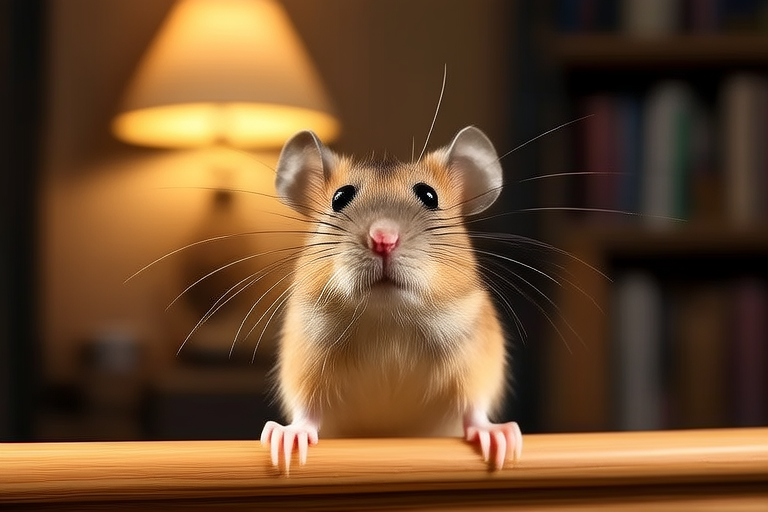The Complete Guide to Understanding and Bonding With Your Fancy Rat
Introduction
Welcome to the wonderful world of fancy rats! These intelligent, social creatures make fantastic pets for people of all ages. Whether you’re a first-time pet owner or an experienced animal lover, this guide will help you understand and bond with your fancy rat. From basic care to environmental enrichment, we’ll cover everything you need to know to ensure your rat lives a happy, healthy life.
Basic Care
Housing
Fancy rats require spacious, clean living environments. A large cage with multiple levels is ideal, providing ample room for climbing and exploring. The cage should be lined with soft bedding like aspen shavings or paper-based bedding to keep your rat comfortable and prevent respiratory issues.
Cleaning
Regular cleaning is essential to maintain a healthy environment for your rat. Clean the cage at least once a week, removing soiled bedding and replacing it with fresh material. This helps reduce odors and prevents the buildup of harmful bacteria.
Toys and Accessories
Incorporate various toys and accessories into your rat’s environment to stimulate their minds and bodies. Chew toys made from safe materials, exercise wheels, tunnels, and hammocks are great additions. Rotate these items periodically to keep things interesting.
Understanding Rat Behavior
Rats are highly social animals that thrive on interaction. They communicate through vocalizations, body language, and scent marking. Learning to read your rat’s behavior can deepen your bond and help identify any potential issues.
Vocalizations
Rats make a variety of sounds, including chirping, squeaking, and even purring. Chirping often indicates excitement or curiosity, while purring is a sign of contentment. Squeaks can range from playful to distress calls, depending on the context.
Body Language
Pay attention to your rat’s posture and movements. A relaxed rat will have a smooth, flowing gait, while a stressed rat may hunch its shoulders or freeze in place. Tail flicks and ear positions also convey different emotions.
Social Interaction
Rats are social creatures that enjoy the company of others. If possible, consider adopting two rats together to provide companionship. Rats raised in pairs tend to be more confident and less prone to stress-related behaviors.
Tips for Bonding
Bonding with your rat takes time and patience. Here are some tips to help strengthen your relationship:
Handling
Handle your rat gently and frequently to build trust. Start by offering treats and gradually progress to picking them up. Always support their body when handling to prevent injury.
Playtime
Set aside dedicated playtime each day to interact with your rat. Use toys and activities that encourage exploration and problem-solving. Supervised play outside the cage can also be beneficial, but always ensure a safe environment.
Positive Reinforcement
Use positive reinforcement techniques, such as treats and praise, to reward good behavior. This encourages your rat to repeat desired actions and strengthens your bond.
Common Health Issues
Despite their hardy nature, rats can develop health problems. Early detection and proper care are crucial for maintaining their well-being.
Dental Problems
Rats’ teeth grow continuously, so they need plenty of chewable items to wear them down. Signs of dental issues include drooling, difficulty eating, and weight loss. Regular check-ups with a veterinarian can help catch problems early.
Respiratory Infections
Respiratory infections are common in rats due to their sensitive respiratory systems. Symptoms include sneezing, wheezing, and discharge from the nose or eyes. Keep the cage clean and well-ventilated to minimize the risk.
Obesity
Overfeeding and lack of exercise can lead to obesity, which increases the risk of other health issues. Monitor your rat’s weight and adjust their diet accordingly. Providing opportunities for physical activity is also important.
Diet Specifics
A balanced diet is essential for your rat’s overall health. Rats are omnivores, meaning they eat both plant and animal matter.
Commercial Diets
High-quality commercial rat food provides a good foundation for your rat’s diet. Look for brands that offer complete nutrition and avoid those with excessive fillers. Pellets are preferable over seeds, as they provide a more balanced nutritional profile.
Vegetables and Fruits
Offer a variety of vegetables and fruits as part of your rat’s diet. Dark leafy greens, carrots, and apples are excellent choices. Introduce new foods gradually to avoid digestive upset.
Treats
Treats can be given in moderation to reward good behavior or as part of training sessions. Avoid sugary or fatty treats, as they can contribute to obesity and dental problems.
Environmental Enrichment
Providing stimulating environments is key to keeping your rat mentally and physically engaged.
Exercise
Encourage regular exercise by providing an exercise wheel and ample space for running and climbing. Exercise helps maintain muscle tone and reduces stress.
Exploration
Create opportunities for exploration by setting up tunnels, platforms, and other structures within the cage. You can also create a safe, supervised area outside the cage for exploration.
Problem-Solving
Puzzles and toys that require problem-solving skills can challenge your rat’s mind. For example, treat-dispensing toys encourage mental engagement while rewarding your rat with a tasty snack.
Conclusion
By following the guidelines outlined in this comprehensive guide, you’ll be well-equipped to provide a loving, enriching environment for your fancy rat. Remember that every rat is unique, so take the time to learn about your individual pet’s needs and preferences. With patience, care, and love, you’ll form a strong, lasting bond with your furry friend.
